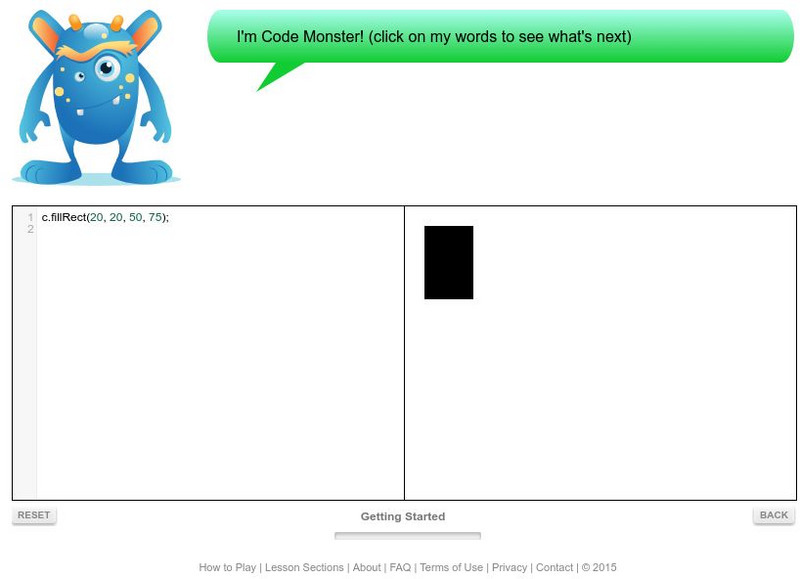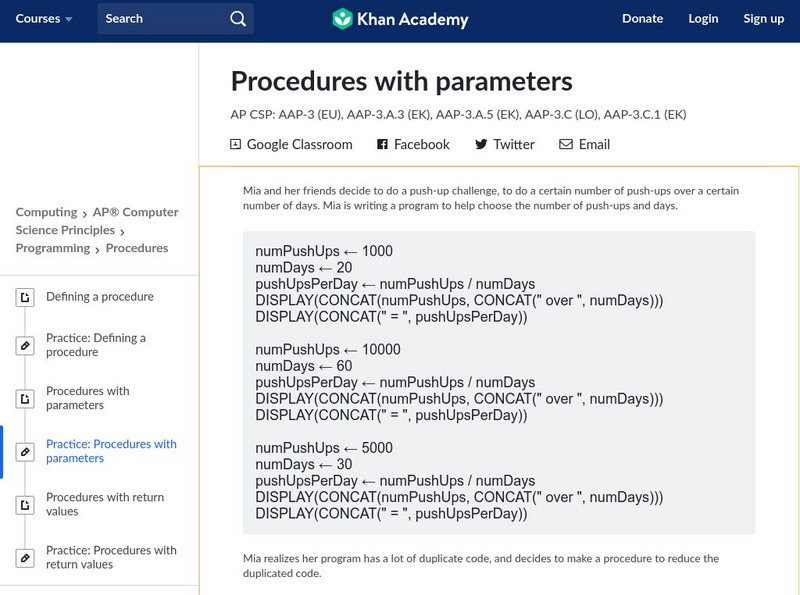Other
Code Monkey: Learn Real Coding
CodeMonkey is an engaging online game that teaches real computer programming to children as young as 9.
Other
Crunchzilla: Code Monster
An instructional program that shows students how to code using JavaScript. The Code Monster and his speech bubble are at the top of the screen where kids read straightforward explanations, commands, and questions. Code Monster is simple...
Khan Academy
Khan Academy: Procedures With Parameters
Practice using procedures with parameters for computer programming.
Khan Academy
Khan Academy: Procedures With Return Values
Procedures can compute values for the rest of the program to use by sending back return values.
Khan Academy
Khan Academy: Procedures With Parameters
When programming, we use procedures to make our code more reusable and to better organize our code. Often-times, we pass parameters to a procedure so that we can change the output of the code.
Khan Academy
Khan Academy: Procedures With Return Values
Practice programming problems using procedures with return values.
Khan Academy
Khan Academy: Nested Conditionals
Learn about when a program selects one of many paths, it can use nested or chained conditionals.
Khan Academy
Khan Academy: Conditionals With If, Else, and Booleans
Learn how omcputer programs also make decisions, using Boolean expressions (true/false) inside conditionals (if/else).
Khan Academy
Khan Academy: Compound Booleans With Logical Operators
Learn how to make shorter and more expressive code by combining simple Boolean expressions using logical operators (and, or, not) to create compound Boolean expressions.
Khan Academy
Khan Academy: Conditionals With If, Else, and Booleans
A tutorial explainning the use of if, else, and Boolean logic in computer programming.
Khan Academy
Khan Academy: Nested Conditionals
Learn how nested conditionals work in computer programming.
Khan Academy
Khan Academy: Compound Booleans With Logical Operators
Learn about computer programming using compound booleans with logical operators.
Khan Academy
Khan Academy: Defining a Procedure Practice
Practice defining a procedure with custom programming.
Khan Academy
Khan Academy: Number Limits, Overflow, and Roundoff
Learn about the limitations of storing numbers in computer programming.
Khan Academy
Khan Academy: Mathematical Procedures and Constants
With just the basic arithmetic operations, learn how to write programs to compute anything that a simple calculator can compute.
Khan Academy
Khan Academy: Storing and Updating Lists
Learn about storing and updating lists of data in code.
Khan Academy
Khan Academy: Iterating Over Lists With Loops
Learn how to use a loop to iterate over each element, repeating the same code for each element.
Khan Academy
Khan Academy: Random Numbers
See how we can generate random values in our computer programs, and use those to make decisions and simulate natural processes.
Khan Academy
Khan Academy: String Operations
Computer programs don't just store strings, they also manipulate them. With string operations, we can chop strings up, mash strings together, or transform strings in all sorts of ways. Learn how here.
Khan Academy
Khan Academy: Storing Strings in Variables
When we're making a program, we often want to store sequences of letters. In programming lingo, we call each letter a character and we call the sequence a string.
Khan Academy
Khan Academy: Storing Data in Variables
Find out how computer programs instruct computers how to process data.
Khan Academy
Khan Academy: Numbered Repetition of Instructions
Computer programs are full of repetition, since our programs automate and simulate the world around us. Programmers use for loops to repeat a set of instructions a specific number of times.

























